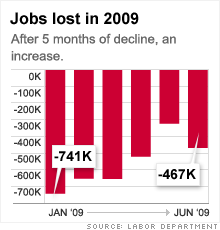Taking a weed whacker to green shoots
The economy may be in better shape now than six months ago, but the June jobs report proves that the recovery is not going to be quick.
NEW YORK (CNNMoney.com) -- It looks like someone may have sprayed a healthy dose of Ortho Weed B Gon on those economic green shoots.
So much for the notion of "less bad" numbers being good enough to get people excited about the economy. There was nothing "less bad" -- let alone good -- in the latest monthly employment report.
The number of jobs lost in June was higher than in May and worse than expected. The unemployment rate inched up again, continuing its steady march toward 10%. And the length of the average workweek slipped to a record low while wages were flat. That means that for those who do have a job, they are working fewer hours and getting a smaller paycheck.
"Let's start with the good news. There is none," said Stuart Hoffman, chief economist with PNC Financial Services in Pittsburgh."There is no silver lining in this report. The economy is still in the grips of the recession."
The June jobs report is a reality check to those who thought that the recession had actually ended earlier this year as well as to investors that giddily bid up stocks in the past three months on the hopes of a quick, robust recovery.
Not surprisingly, stocks plunged Thursday morning, with the major indexes all losing at least 2%.
Talkback: How high will the unemployment rate go? Are you worried about your own job security? Leave your comments at the bottom of this story.
Now don't get me wrong. The weak job numbers for June are not necessarily a sign that the economy is on its way back to the truly scary levels of late last year and earlier this year.
After all, the monthly job loss of 467,000 in June is still an improvement, if you will, over the average loss of 691,000 jobs a month in the first quarter of 2009.
Along those lines, the jobs report for July will be an important indicator of whether the economy is really slipping or if the recovery is just unfolding at a slower pace.
"I wouldn't make much of the June report. If we have another decline of more than 400,000 jobs in July that would be a problem," said John Canally, economist for LPL Financial, an independent broker-dealer based in Boston.
Canally added that the one-tenth of a percentage point increase in the unemployment rate in June is an encouraging sign considering that the joblessness rate had been rising at an average of about four-tenths of a percentage point a month since the collapse of Lehman Brothers in September.
Hoffman conceded that there may be some unique factors that made the June jobs report worse than it might otherwise have been, most notably the shutdowns of General Motors (GMGMQ) and Chrysler plants due to their bankruptcies.
But he added that until employers are comfortable enough to start looking for new workers, there's little consolation in the fact that the unemployment rate is rising more gradually than before.
"You could make the case that number of layoffs are declining but there is still no hiring. I don't draw much comfort from a small uptick in unemployment," Hoffman said.
Some economists also fear that the monthly loss of "only" 322,000 jobs in May may have been an anomaly and that there could be more months similar to June ahead before the job market truly gets better.
"The jobs number in May was the aberration," said Martin Regalia, chief economist with the U.S. Chamber of Commerce. "We're pulling out of the steepest part of the decline but still declining at this point. Everybody got a little overexuberant with the May jobs numbers."
Regalia said he expects job losses to persist until the first quarter of 2010 before the labor market begins to stabilize. He added that the unemployment rate, which hit 9.5% in June, will probably peak between 10% and 10.5%.
That's clearly not good news. Even though the unemployment rate has tended to keep rising even after past recessions have technically ended, it's hard to envision a full-blown economic rebound as long as consumers are scared about their job security and cutting back on spending.
"We're not catapulting into the abyss anymore. But the fact that wage growth was zero, combined with falling hours of work, will constrain any consumer spending growth. This puts families in a bind," said Lawrence Mishel, president of the Economic Policy Institute, an independent think tank based in Washington.
Consumer spending is still the biggest component of the nation's economy. So it's silly, not to mention dangerous, to believe that the economy is going to come roaring back to life later this year if we're in for another jobless recovery.
"The economy may finally stop shrinking sometime later this year, but we could still be losing jobs for many months," Mishel said. "To say employment is a lagging indicator is dismissive of the economic impact on real people."
Anyway, I hope that everyone enjoys a great, safe 4th of July weekend. It's now time for an early summer break. The Buzz will be back on July 15.
Talkback: How high will the unemployment rate go? Are you worried about your own job security? ![]()




